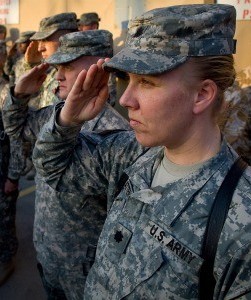Organizations Mobilize to Help Underserved Women Veterans
by Randall Rutta, President and CEO
 As a leading provider of services for veterans, Easter Seals is on the front lines when it comes to identifying the needs of our returning service men and women. We recently released a Call to Action white paper asking policymakers to recognize an urgent need: greater funding support for our female veterans.
As a leading provider of services for veterans, Easter Seals is on the front lines when it comes to identifying the needs of our returning service men and women. We recently released a Call to Action white paper asking policymakers to recognize an urgent need: greater funding support for our female veterans.
It is a well-documented problem. In “The Independent Budget, Veterans Agenda for the 114th Congress,” leading veteran organizations highlighted a disturbing disparity between services provided for returning women versus their male counterparts.
“Despite a government that provides an array of benefits to assist veterans with transition and readjustment following military service,” wrote the authors, “serious gaps are evident for women in every aspect of existing federal programs.”
And, as concluded in the Easter Seals white paper, these gaps and other barriers to accessing community-based reintegration services are impeding the successful transition of female veterans into civilian life.
A recent study found that women veterans continue to experience “stubbornly high” unemployment rates, a known precursor to poverty. The U.S. Department of Veterans Affairs (VA) estimates that 10 percent of women veterans live in poverty and that, for those between 17 and 24 years old, nearly two of every 10 veterans is impoverished.
Women veterans are also the fastest growing segment of the homeless veterans population and are up to four times more likely to be homeless than non-veterans. Many face the same issues as returning male veteran including psychological, physical and social trauma relating to their military service. Affordable child care is ranked the highest unmet need of female veterans and the majority of homeless housing for vets restricts or does not allow for children.
These needs are urgent and growing. Women comprise approximately 20 percent of newly enlisted recruits. They are also one of the fastest growing veteran segments, making up one-fifth of the veteran population. An estimated 200,000 female veterans will transition from military to civilian life over the next several years.
So how best to address the growing needs of our female vets?
In its 2014-2020 strategic plan, the VA recognizes the importance of “partnering with organizations that can best provide what we cannot or should not” and leveraging “productive partnerships to augment VA care.” Research by the Center for a New American Security (CNAS) found that “the most effective community reintegration models…are those that base operations at a credible, local nonprofit organization that coordinates and deploys both public and private resources” for veterans and their families.
Easter Seals has long been just such an agency partner, providing a highly effective model of support for our returning female servicewomen.
Our care coordinators take a holistic approach, embracing not just employment and housing concerns, but also physical and psychological needs during transition, focusing on the individual needs of each veteran. We know the value of emergency financial aid and have initiated a Women Veterans Financial Assistance Project. We are experts at leveraging community resources for our female veterans and provide ongoing, preventative services after the initial transition period.
But with increasing numbers of female veterans returning to their communities in need of support, now is the time to expand these partnerships to increase gender-specific programs and improve quality of care for women veterans.
Federal policy makers must authorize and fund federal care coordination program grants to community-based organizations, such as Easter Seals, that provide crucial local support to women veterans.
Congress should fully fund existing community care coordination programs that now benefit women veterans such as the Homeless Veterans’ Reintegration Program (HVRP), Supportive Services for Veteran Families (SSVF) Program, and the Rural Veterans Coordination Pilot (RVCP). These programs must be given long-term authorizations.
Finally, Congress should expand veteran reintegration programs to reserve a portion of the funding for grants targeted at the unique and growing needs of women veterans. State policymakers should similarly increase funding of programs for female veterans and fund asset-mapping and coordination to ensure funding for these vital programs.
Programs such as those provided by Easter Seals are in place to meet the needs of our returning servicewomen, but we must be given the means to grow them if we are to remain effective partners in support of our veterans.






